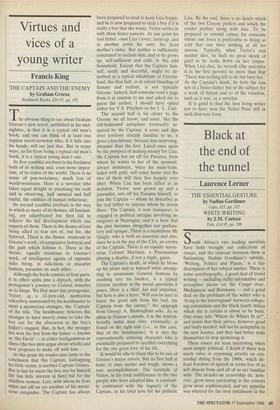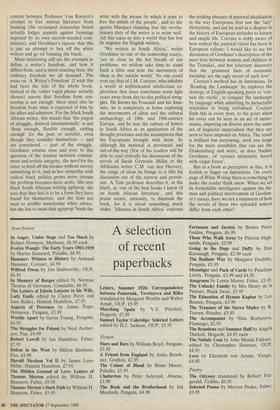Black at the end of the tunnel
Laurence Lerner
THE ESSENTIAL GESTURE by Nadine Gordimer
Cape, f15, pp. 352
WHITE WRITING by J.M. Coetzee
Yale, f14.95, pp. 208
South Africa's two leading novelists have both brought out collections of essays, and the contrast between them is fascinating. Nadine Gordimer's subtitle, `Writing, Politics and Places,' is a fair description of her subject matter. There is some autobiography, a good deal of travel writing — including richly informative and perceptive pieces on the Congo river, Madagascar and Botswana — and a good deal on the problems of the writer who is `living in the interregnum' between collaps- ing colonialism and the black South Africa which she is certain is about to be born. One essay asks 'Where do Whites fit in?', and insists that their advice, however good and badly needed, will not be acceptable in the new Azania, and they had better train themselves to stop proferring it.
These essays are least interesting when most simply political. I doubt if there was much value in reprinting attacks on cen- sorship dating from the 1960s, which de- fend freedom of speech in terms few of us will dissent from and all of us are familiar with. The attacks on censorship do, how- ever, grow more interesting as the censors grow more sophisticated, and my appetite was whetted for the next instalment in the contest between Professor Van Rooyen's attempt to free serious literature from banning (the revamped censorship board actually lodges appeals against bannings imposed by its own narrow-minded com- mittees), and Gordimer's riposte that this is :just an attempt to buy off the white writers and go on banning the black.
More interesting still are the attempts to define a writer's freedom, and how it differs from, and is more exacting than, the ordinary freedom we all demand. The essay on 'A Writer's Freedom' (I wish this had been the title of the whole book, instead of the rather vapid phrase actually chosen) asserts that freedom from cen- sorship is not enough: there must also be freedom from what is expected of him by his allies and admirers. For the black South African writer, this means that 'the jargon of struggle, derived internationally' is not `deep enough, flexible enough, cutting enough' for the poet or novelist, even though they consider themselves - and are considered - part of the struggle. Gordimer returns over and over to this question of the tension between commit- ment and artistic integrity, the need for the latter to feed off the former without merely submitting to it, and as her sympathy with radical black politics grows more intense the problem becomes more acute. She sees black South Africans writing agitprop, she sees that they feel it to be a form they have found for themselves, and she does not want to proffer unwelcome white advice, but she has to insist that agitprop 'binds the artist with the means by which it aims to free the minds of the people', and so she quotes Marquez claiming that the revolu- tionary duty of the writer is to. write well. All this takes us into a world that has lost its urgency for English writers.
`We writers in South Africa,' writes Gordimer in one of the censorship essays, `are so close to the hot breath of our problems, we seldom take time to stand back a little and note the movement of ideas in the outside world.' No one could ever say that of J.M. Coetzee, who inhabits a world of sophisticated intellectual ex- ploration that must sometimes seem light years away from day-to-day political strug- gles. He knows his Foucault and his Saus- sure, he is completely at home exploring the movements of ideas and the cultural archaeology of 18th- and 19th-century Europe, and he sees the culture of letters in South Africa as an application of the thought processes and the assumptions that the Europeans brought with them. So although his material is provincial and out-of-the-way (few of his readers will be able to read critically his discussions of the novels of Sarah Gertrude Millin or the Afrikaans writer C.M. van den Heever), the range of ideas he brings to it lifts his discussion out of the narrow and proyin- cial. A Yale professor describes it, in the. blurb, as 'one of the best books I know of on South African literature', and this praise seems, curiously, to diminish the book, for it is about something much wider. 'Idleness in South Africa' explores the striking absence of pastoral idealisation in the way Europeans first saw the 'lazy' Hottentots, and can be read as a chapter in the history of European attitudes to leisure and simple life. Coetzee is richly aware of how central the pastoral vision has been in European culture: I would like to see his discussion of Gordimer's description of the pure love between women and children in the Transkei, and her reluctant discovery that the 'grimmest facts of economic hardship are the ugly secret of such love'.
Coetzee's method has its limitations. In `Reading the Landscape' he explores the strategy of English-speaking poets to 'con- tain the exotic', to conquer the landscape by language while admitting its ineluctable resistance to being verbalised. Coetzee finds this in every poet, to the point when his essay can be seen as an act of mono- mania, imposing on diverse poets the same act of linguistic imperialism that they are seen to have imposed on Africa. The result is brilliant but narrowing, until one longs for the mere sensibility that can see the Drakensberg and write, as does Nadine Gordimer, of 'ravines intimately furred with virgin forest'.
But in a book as perceptive as this, it is foolish to linger on limitations. On every page of White Writing there is something to make the reader think anew. When we set its formidable intelligence against the hu- man and political involvement of Gordim- er's essays, have we not a statement of how the novels of these two splendid writers differ from each other?



































































 Previous page
Previous page